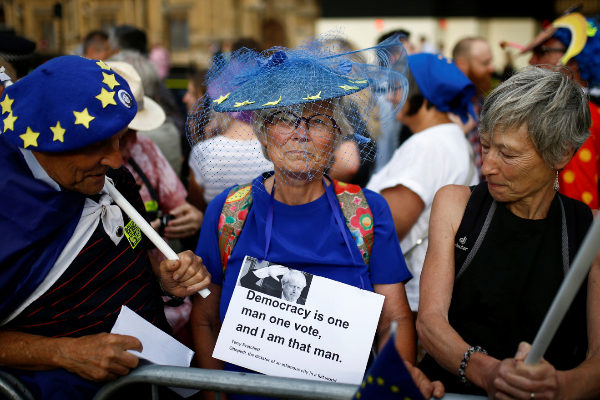- United Kingdom: The Queen accepts Boris Johnson's plan to suspend the British Parliament
- Protests: The opposition calls the British to "take the streets" against Boris Johnson
- Brexit.Donald Trump says Boris Johnson is "great" for the UK after suspending Parliament
"I'm very sorry," my tablemate, former rector of one of Cambridge's lightest colleges, told me. Boris Johnson, then Foreign Minister, had just begun his welcome speech to the participants in the Spanish-British gatherings. Surprised by the observation, and worried that those apologies were, as is often the case in the elegant ways of the British, a way of drawing my attention to something I was actually doing wrong, I asked for clarification. To my surprise, they landed in a whisper in my ear in the form of "I am deeply ashamed that this man represents my country." The anecdote took place a little less than two years ago in the city of Bath, emblem of that first Europeanization that was Romanization and which today contrasts with the desire for European emancipation of the United Kingdom. Since then, as impossible as it may seem, the descent into the chaos of the Brexit UK has continued while, in parallel, we have witnessed the rise to Downing Street of a character like Boris Johnson.
In journalism or politics, in addition to opportunism, lies and betrayal, the Johnson method has consisted of falsifying the facts and breaking the rules. Before we talked about the fake news, British Commissioner Chris Patten had already diagnosed Boris Johnson, then a correspondent for the 'Daily Telegraph' in Brussels, as one of its greatest exponents. His lies ended his journalistic career, but ended up boosting his political career, first as a deputy, then as mayor of London, then as foreign minister and, finally, as prime minister of a country with a permanent seat in the Security Council of the United Nations and an arsenal that is estimated at 120 nuclear warheads.
Just as Johnson was falsifying journalism, he is now preparing to falsify democracy by closing Parliament so that he cannot stop Brexit. We must remember that in March the current British Parliament already voted, by 312 votes against 308, against a Brexit without agreement. Although the parliamentary system does not require Johnson to stand for elections to legitimize his office, that a prime minister who has not attended an election intends to make such a far-reaching and profound impact decision knowing in advance that Parliament is against it, reflects Faithfully your character. Johnson wants two things: to remain prime minister and force a 'hard Brexit'. But Parliament stands between these two wishes: if it calls elections it is quite unlikely that it will win them and if it asks Parliament it is also highly unlikely that it will obtain its consent to force a Brexit without agreement. So avoid asking both citizens and their representatives. An obvious solution for easy, but impossible for cheater and anti-democratic.
Close a Parliament so that it cannot control the Government in a vital decision for the future of the country? Similar decisions at different latitudes would have much thicker qualifications; in fact, they evoke the ways of Erdogan or Putin. Around the world, the ebb of nationalist populism that has not ceased since the 2008 crisis translates into a concentration of power in the hands of authoritarian leaders that undermine democratic institutions, divide citizens and weaken the media with disinformation strategies and delegitimization. If the United Kingdom were not in the process of leaving, it would be worth considering whether to open a procedure for violating democratic norms and values similar to that launched against the governments of Poland and Hungary. A Brexit without parliamentary ratification constitutes a deep and very serious violation of the rights of millions of British citizens.
To date, and for obvious reasons, the European Union has given up interfering in how the British Government is managing Brexit. But if Johnson continues its course, the question is whether the European Commission and the member states can remain impassive and accept a hugely expensive exit agreement for both parties, both economically and for millions of people, executed by a political leader who has closed Parliament to prevent him from rejecting it. If Brexit generates a constitutional crisis in the United Kingdom, staying out of it will be as difficult as helping to find a way out which, in turn, does not generate a crisis within the Union itself. After the cold war, who was going to tell us ?, Washington and London, led by two radical populists, have become the main element of instability for Europe. The 'Brexitcene', a new phase of British politics, has already begun, led by 'Homo Johnson'. Jean Monnet catch us confessed.
According to the criteria of The Trust Project
Know more- Boris johnson
- European Union
- European Comission
- London
- Europe
- Brexit
- UK
EditorialJohnson challenges democracy
TadeuSalvaje
Thoroughly the United Kingdom has already changed

